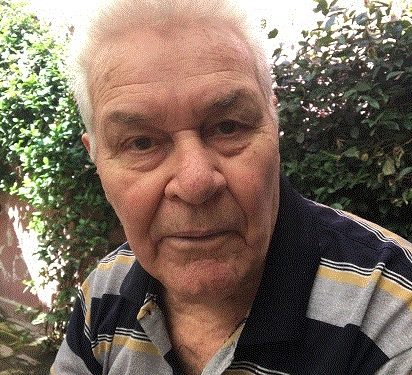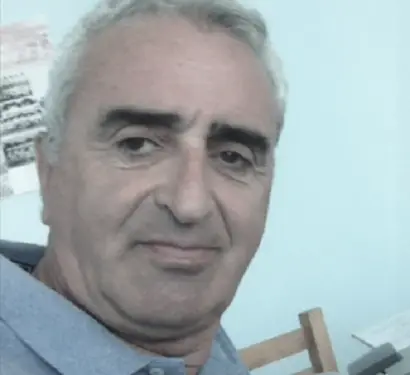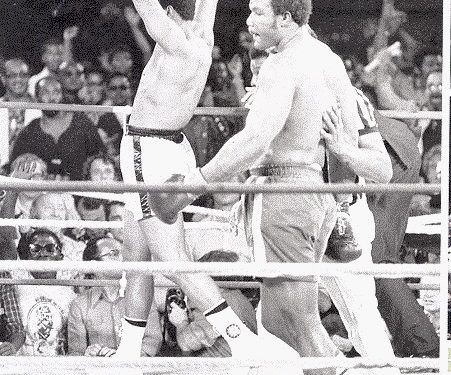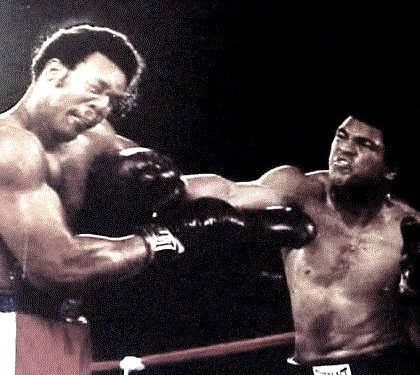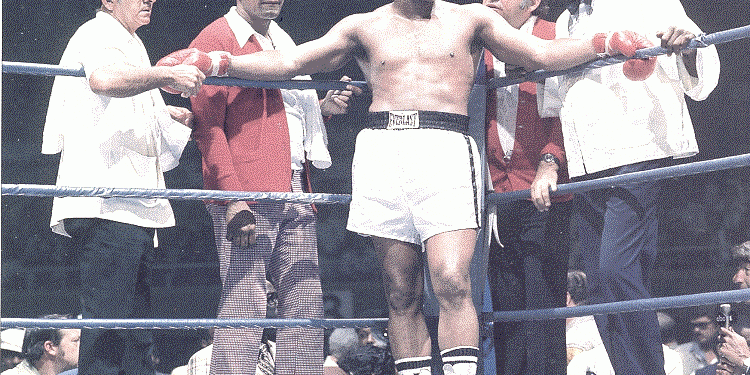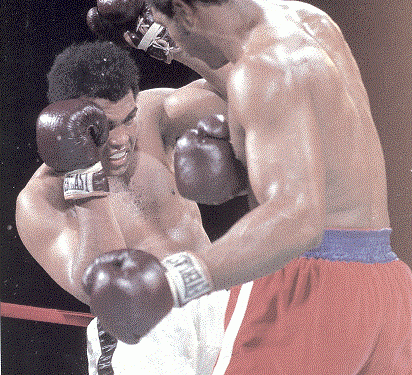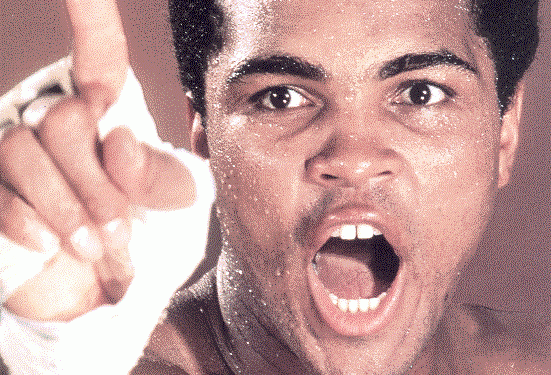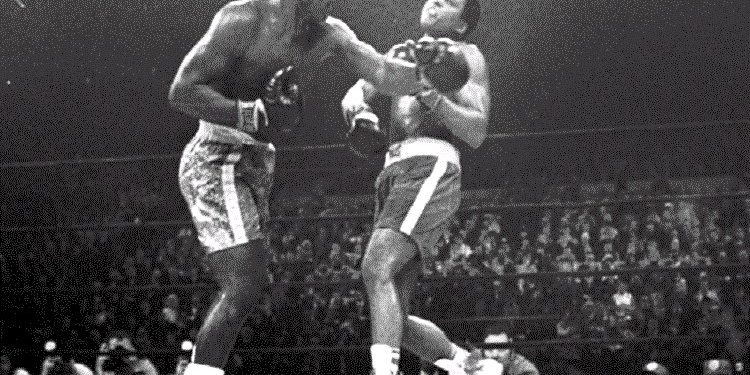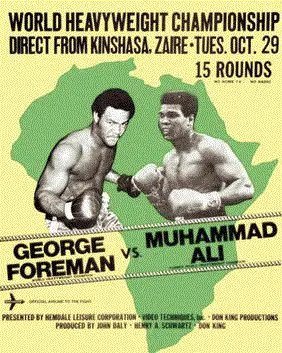From Uvil Zajmi
Memorie.al / A career and life inseparable from matches in the ring, as well as from literature. Writer and publicist, but also editor of “Popular Sport”. Ahmet Golemi experienced that match more than anyone else, even in terms of similarity he was a Kasius Klei…! That’s how they called him: “Albanian Kasius Klei”. Then the sentence, the absurd imprisonment and even the accusations in the investigator, for the sympathy he had for the American boxer. Friendship with Ismail Kadare, also an admirer of boxing and the passion of the card colossus, for Klein. Regarding these and others, in the context of the 50th anniversary of the famous match, Klei-Foreman, held on October 30, 1974, we are publishing the interview we received from Mr. Ahmet Golemi, shortly before he passed away.
Mr. Ahmet, let’s first talk a little about our boxing?
Albanian boxing was imprisoned in 1964, when in January in the “Sporti Popullor” newspaper; the calendar of its national activities for that year was not announced. It was quietly revealed that the sport of boxing has been removed, but no one spoke. Boxers moved on to other sports, but the echo remained, as boxing as an individual sport was very popular and had its stars.
Many enthusiasts followed him secretly from the Italian or Yugoslav TV channels, especially when the meetings were organized in America, which corresponded to the morning hours in Europe. Stars like the Italian Benvenuti and Kasisu Klei emerged, a name that hit you well.
When did your “relationship” with Klein begin?
For the first time I heard the name of Clay, or Muhammad Ali, on the radio, during the Rome Olympics. We were gathered at the “Vjosa” hotel, when in “Sporti Popullor” it was written: “18-year-old Kasius Marcelios Klei, defeated the European champion twice in the final. Then the meeting with Sony Liston, which became an issue all the way to The Hague, as Klein accused him, of his movements, as if he was deliberately withdrawing from the confrontation. While on the screen for the first time, it was the match against Floyd Paterson.
Where and how did you watch the matches?
At the family of the Misja brothers, or at the house of Shahin Kadare, a doctor and Ismail’s brother. Together with Dhimitër Xhuvani, Teodor Laço, Vath Korreshin, Qamil Buxheli, etc. They were close friends and we used to gather in a small room where there was a TV.
I remember on March 8, 1971, Klei-Frezer, a dramatic match, from 3 to 6 in the morning, then we went out as illegals, since it was still night and the day hadn’t dawned. “How is it possible – said the revolted Ismaili, – to give the victory to a boxer like Frezer”?! Ismail also loved boxing; I even gave him two tours so that he could train himself.
Did you know that your passion for boxing was not liked?
I was giving some sneaky thoughts, but I had caught the eye of the Security, who considered it a counterpoint to the abolition of boxing. Vangjel Koja, or as everyone called him, “Xhela”, one day met me on the street and told me in confidence that; Feçor Shehu, deputy minister of the interior, had told him; “Tell Ahmet Golem not to talk about boxing, because he has overdone it.”
Klei-Foreman was supposed to take place in September, why was the date changed?
The match was scheduled for September 30, 1974, but during a workout, Foreman injured his right eye and therefore, the match was postponed to October 30. We gathered at Vath Korresh’s house and waited from 02:00 to 04:00 in the morning. No relation to Kinshasa…! We went out at 6 in the morning and there Adem Istrefi said jokingly: “What Ahmet Golemi did to us, the whole night without sleep, even Ahmet Zogu didn’t do to us.”
How was the atmosphere in the media when October 30 was approaching?
I worked as an editor in the “Sporti Popullor” newspaper, where under no circumstances should boxing be talked about or written about. Meanwhile, the day before, a friend of mine, Bashkim Misja, a teacher at “7 Marsi”, came to me at MAPO and said: “We bet, that Foreman beats Klein”, as they knew that I was his admirer. “I don’t bet, they’re like two eggs,” I told him.
“No, – he insisted, certainly with humor, – you 100, I 1000 lek. I met him the next morning and he offered me 1000 lek. I went to the confectioner “Tirana” and bought a cake, I remember for 500 lek, which, when I was arrested a few years later, they would mention it to me in the interrogator.
Can we say that it was a sports Albania, in front of the black and white screen?
The match was broadcast by “RAI” and the problem was the signal, but Durrës guaranteed it. We, four former boxers, were friends: Ramiz Reka, N. Dauti, we decided to see it there, at the house of Fehmi, Ramiz’s brother. They left in the morning of October 29, while I was at work in the evening. On the last train, there was also a group of theater actors in the carriage; we even saw each other, reserved, turned our faces away.
How was the atmosphere before the meeting, do you remember?
Sympathy for Klein went so far that people said to Foreman: “How can you meet the Prophet”?! So great was Klei’s popularity in Zaire, even during the meeting, the audience chanted “Ali bomaye” (Ali killed). A song that later became popular, although they prayed that Foreman would not “kill” Ali. So certain was the end.
Let’s talk a little about the challenge…?
Opposite were Klei, a “leopard” in terms of quality and agility, against steel muscles like “knockout” Foreman. The latter was a monster. The referee was kind, allowing Klein, when he went to the ropes, to talk to him, to put psychological pressure on his opponent.
To come to the 8th round?
Round 8, 2:58 on the clock, Klei lands a left that lifted his head, enough to land a straight to the face. Then an explosion, with the famous seven-eight fatal blows, an unprecedented, shocking technical knockout. It was extraordinary to see a colossus like Foreman lying on the mat. He got up after referee Clayton reached “9”, but from the footage and according to specialists, he had extended the count to “10”.
Was the referee a former basketball player, as it was said then?
I remember that the referee was a former NBA basketball player, African-American, Zachary M. Clayton, and nicknamed “Zack”. He was 183 cm tall. After parting with basketball, he was dedicated to refereeing boxing and very soon, he reached the top, with the peak in 1974, in Kinshasa, in the Foreman-Ali challenge. Clayton again arbitrated Klein, in the meeting with Trevor Berbick, in 1981.
What was the reaction after the match?
In the following, Foreman stated that the signal to get up came very late from the coach, who after the match, would declare that in that condition, he could not continue. While Foreman himself, many years later, would determine that; “at least for one night and that evening, Ali was the best.”
It was said to be an unprecedented strategy by Clay’s staff…?
That match was prepared in secret, by his staff, as among the absolute displays of a strategy, execution and technical and tactical interpretation. Such a strategy was unprecedented for heavyweights.
Relying on the ropes to absorb the champion’s power punches to get through the first rounds, especially the third, no opponent had been able to withstand Foreman until that round.
This made him wild, disorientated and nervous, draining a lot of energy. After a few rounds, Foreman looked tired and in the 6th, he appeared slower.
After Klei-Foreman, the way of boxing also changed, didn’t it?
That fight marked a drastic change in boxing style. Evidenced the capacity, physical resistance, for punches received and given, applying the passive tactic: “rope-a-dope”. Over the following years, Foreman made a series of accusations to justify the loss, that he was poisoned by a drug thrown into the water. He also accused Clay’s trainers of deliberately leaving the ropes loose to favor their boxer.
Then the early morning return to Tirana and endless discussions…?
We returned with the first train from Durrës and when we got down to the station square, it seemed like a rally from the discussions. No comments in our press, since the word boxing was considered an enemy in “Sportin Popullor”, not even in the column; “Degeneration of bourgeois sport…”, nothing was written, because they would say it was put on purpose. In the editorial office, “La Gazzetta Dello Sport” would come; Skënder Tupja would pick it up and give it to us to read. I remember a picture of the 8th round, when Foreman was lying down and Ali could have given him the fatal blow, but he didn’t.
It has been said that one of the accusations made against you by the investigator was that you propagated Klein…?
Yes, it is more than true. People did not speak; they were afraid, only in close circles, as the Security was vigilant and followed them. I made a mistake that I did not know that I was being monitored, since I was honest.
I went to the Writers’ League, trusted friends, people, informing them about boxing, about matches, about Klein, etc. In the newspaper we had an associate of the Security, who was one of the witnesses, saying for me that; “he was talking to people, about Kasius Klein…”!
It is said that in the inquest, they also remembered the cake you had ordered for Clay’s victory. So serious, was the situation?!
As I told you above, it was about the cake I bought, and the moment I left the “Tirana” pastry shop, at former Estrada, a journalist from Durrës, coming from the train station, met me and humorously said: “Cake for Muhammad Ali, right? “Yes”, I jokingly answer. It was exactly that cake, which they reminded me of in the interrogator, since they had been informed about it in detail.
After all these years, did you think Klei would win that challenge?
Yes, I was sure he would win. Ali was the revolution of that sport, combining intuition, fantasy, athleticism, art and everything else. Even the 4x4m ring, years later, was enlarged to 6.20×6.20, thanks to its spectacular boxing. Think also Mao Zedong, who had banned boxing in China, after seeing Klein, brought it back.
How far and how close are you to Clay-Foreman today?
Years have passed, decades have already passed, but that Ali-Foreman match brings me closer to that time. It brings me back to that passion and I feel like I was in Kinshasa. I later wrote the novel “The White Monster” because I had my boxing crush, Klein. But Kadareja also wrote the novel “Monster”, which he published in November 1972. Memorie.al




